Are those fake Lamborghinis and Bugattis sold online just about fun? Or is it fraud?
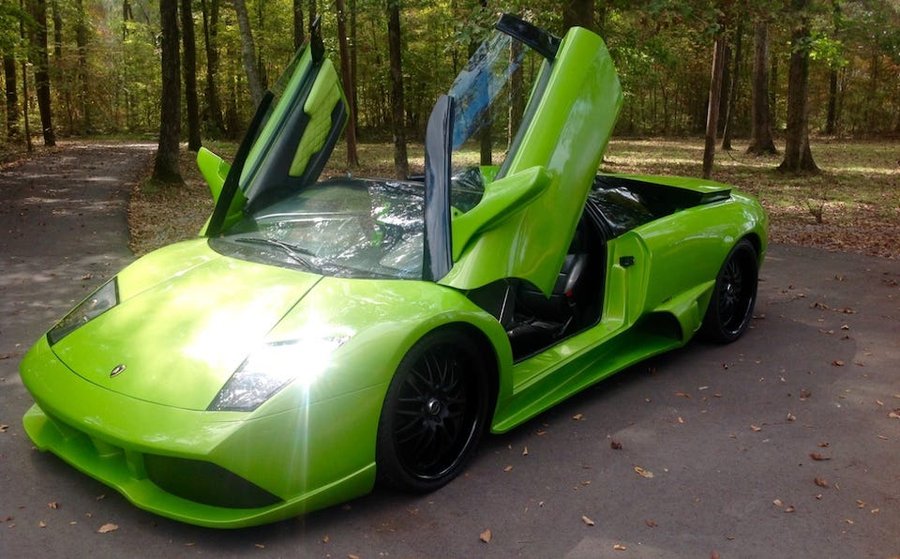
Randy Morrow, a retired police officer in Tennessee, is selling what appears to be a sleek 2010 Lamborghini Murcielago for a "reasonable" price: $40,000.
It's a great deal for a car that typically costs over $200,000 and has all the exotic details you'd expect from a luxury automaker. It's aggressive-looking, with sharp angles and dramatic scissor doors. The coupe sits low and wide, and it has a candy-colored paint job.
Only the car is not a real "Lambo."
It's what's referred to as a "replica" or "kit car" among a niche community of auto enthusiasts who cobble together parts from various sources to construct imitations of head-turning sports cars and luxury vehicles. Building these faux cars is legal, too, as long as you aren't passing them off as the real thing or selling them in large numbers.
Morrow opted to list the carbon copy on LamborghiniReplicas.com, one of many websites where unique replicas and luxury car parts await eager buyers who want the prestige of owning an exclusive ride without shelling out hundreds of thousands of dollars. Replicas sell for as low as $20,000 and run up to six figures.
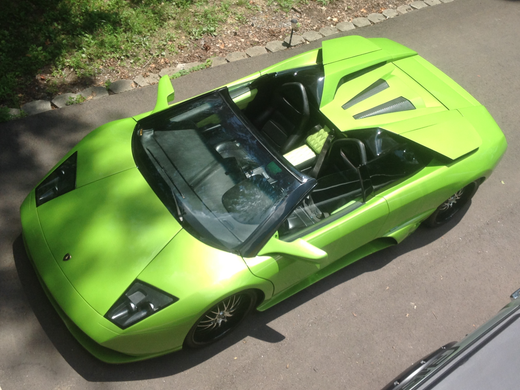
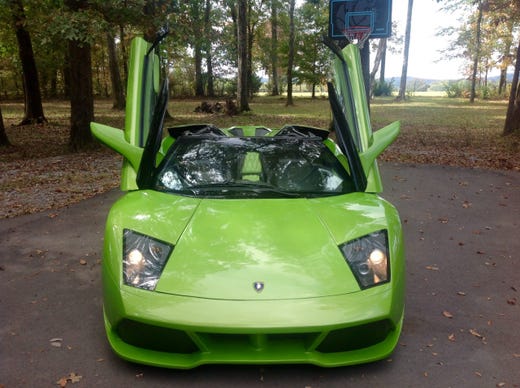
These DIY vehicles are nothing new. In the early '60s, companies like Fiberfab and other small-time operations would create Ford GT40 replicas using a Volkswagen Beetle's chassis and sell the cars under a different name. By the '70s, motorists could buy component parts to convert older models into unique classics. Today, many replicas are made using old Pontiac Fieros as a base.
Are kit cars harmful?
But as the kit cars crop up in online resale websites, the cottage industry of builders seems to be drawing more attention from the public, selective pushback from the automakers whose cars they imitate and criticism from car purists who just don't seem to get that it's all about fun.
"There are some people who feel that kit cars devalue the original cars," and social media may be a magnet for them, according to Robert Ross, an automotive consultant for Robb Report magazine. "However, I don't see too many legitimate owners of the real cars bad-mouthing or berating people who create the copies. It's people whose comments are only generated to stir up animosity."
A physicist in Colorado and his son made waves when they spent $20,000 on materials and used a set of 3D printers to build a fully functional Lambo Aventador replica in October.
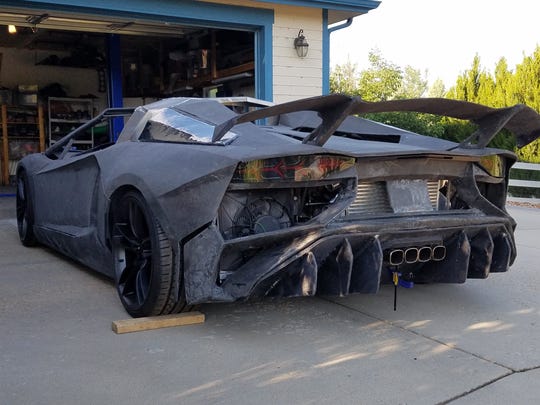
The father, Sterling Backus, told USA TODAY that since going viral, "there've been trolls on social media making flippant comments and saying things like, 'This is stupid. What a waste of money.'"
He has no intention of selling the car once it's done, but people have asked, Backus said.
These car hobbyists say that realistic knockoffs have become more valuable over the past several years as luxury car companies hunt down replica factories and pull body molds from auto shops.
Eric Bonnette, an entrepreneur who buys, builds and flips kit cars, posted a Craigslist ad in September advertising a 2012 Bugatti Veyron "replica" built on top of a 2002 Mercury Cougar V6 chassis. The listing included close-ups of the copycat car, a few details and a $125,000 price tag along with the owner's contact info.
Soon after listing the vehicle, Bonnette received dozens of text messages and emails from strangers saying "such heinous things like 'man, you're a loser. You're a moron," Bonnet said. He also received emails from angry purists saying, "Bugatti should sue you!"
Are replica cars legal?
Mark McKenna, a Chicago-based patent lawyer, said individuals who create personal clones of dream cars are less likely to face trademark lawsuits than people selling replicas in large numbers.
However, legacy car companies could still argue that the design, or a part of the design, is "substantially similar" to a design that's patented, though these types of cases are rare and hard to prove.
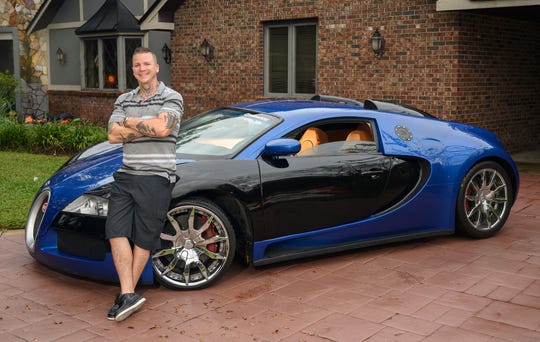
"Doing it just for yourself on a one-off basis is probably not going to get detected and be pursued," McKenna said. "The risk level is low because making one of them and not selling it is probably not very costly for designers."
A 2015 bill gave "low volume manufactures" the legal authority to produce a limited number of replica vehicles so long as the inspiration car is at least 25-years-old.
Imitation vehicles become more troubling when creators or sellers try to pass off fakes as the real thing, or when they operate larger-scale factories offering exotic car copies that cost little more than a Ford Focus.
Over the summer, police in Brazil shut down a factory that was producing fake Ferraris and what's been dubbed "Shamborghinis." The replicas were being sold for about $45,000 to $60,000 each. The company's Instagram page remains active.
An abundance of fake supercars with replica badges like those made in Brazil are much more threatening to car manufacturers than artistic enthusiasts who use kits and cobbled together pieces to build a look-a-like, experts say.
Still, legal replicas are sometimes shunned by the car community at large. For instance, there are reports that replicas were relegated to the sidelines at this year's Pebble Beach Concours d'Elegance, a prestigious car show that happens every year in California.
Can fraud happen?
Although most backyard builders tend to have the best intentions, fraud and deception "certainly has happened," according to Dave Kinney, a senior appraiser at USAppraisal, which assesses the value of collectible automobiles.
"I call it the third-owner syndrome," Kinney said. He said the first buyer of a replica typically knows the car is not authentic. "The first owner buys the car knowing completely legitimately what he's getting into. The second owner possibly knows the same thing. But there could be a motivation for him to put up a Craigslist ad saying he's got a 2011 Bugatti Veyron and he's selling it for half a million dollars."
Bugatti Veyron prices start at about $1.5 million.
A spokesperson for Bugatti said that the luxury automaker appreciates the enthusiasm of people "going at any length to own or build a Bugatti replica as it shows the strength and attraction of the brand."
Lamborghini said in a statement that it doesn't " intend to pursue criminal prosecutions against individuals" but warns that knock-offs don't offer the same safety features as regulated cars.
As far back as 2000 sport-car makers have gone after body shops for selling multiple imitations of iconic cars without permission, while one-offs created by hobbyists were seen as flattery.
In 2000, Ferrari launched a suit against an Oregon company for building replica sports cars and in 2013, Lamborghini sued an Alabama-based firm for creating Lambo mock-ups.
History of car kits
Kit cars have been around for decades. But replicating modern sports cars may be a lingering phenomenon from the '80s and '90s, according to Ross.
"As cars were really becoming more popular icons of status, and with brands like Mercedes Benz and Porsche producing more expensive and flamboyant cars, we soon saw the fabrication of fiberglass parts to emulate these," Ross said.
Replicas were popularized because "all it took was a minimal expenditure for materials and a significant amount of labor," Ross said.
Now the subculture of hobbyists celebrates their masterpieces by entering them in tradeshows or spotlighting their creations in community Facebook groups. They often use websites like Craigslist or platforms like Facebook Marketplace to buy, sell and trade parts.
How are replicas made?
There are several methods for taking an old, cheap car and fashioning it into something that looks powerful and fast. But it takes a lot of time and actual talent.
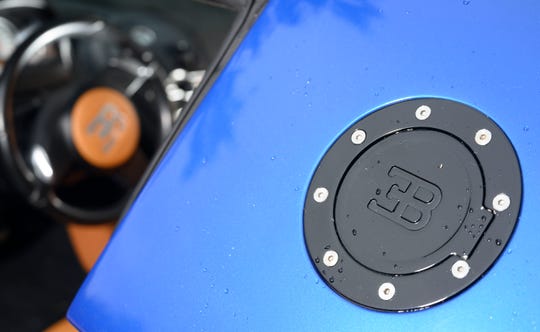
One of the most popular ways to clone a car is to build it using the chassis of a street-legal vehicle and a fiberglass shell inspired by high-end cars. The shell elevates the humdrum ride into a Lambo, Mustang or Camaro look-alike.
The Pontiac Fierro and Porsche Boxer are some of the most popular base models because the wheelbases and the engine placements are easier to build upon, said Bonnette, who said he has flipped several replicas over the internet.
Other methods of building copycat cars include modeling the outer body using dimensions and photographs, or rubbing off patterns using 3D scanners, according to Kinney, the senior appraiser at USAppraisal.
"Then, instead of getting the Lamborghini taillights you add some Hyundai tail lights that look like it," Kinney said. "And you buy some headlights from a Ford or something along those lines and just put it together."
Bonnette's Craigslist listing expired with no buyer in sight. But he's still hoping to sell the Bugatti Veyron replica, which he put thousands of dollars of work into.
Morrow said he'll only sell his Lambo replica if he finds the right buyer, though he's received some alluring offers to swap his replica for another.
"I listed it online to see what's out there," Morrow said. "But I've been eyeing the newest Corvette, so I may end up selling it to buy that."
Nouvelles connexes


